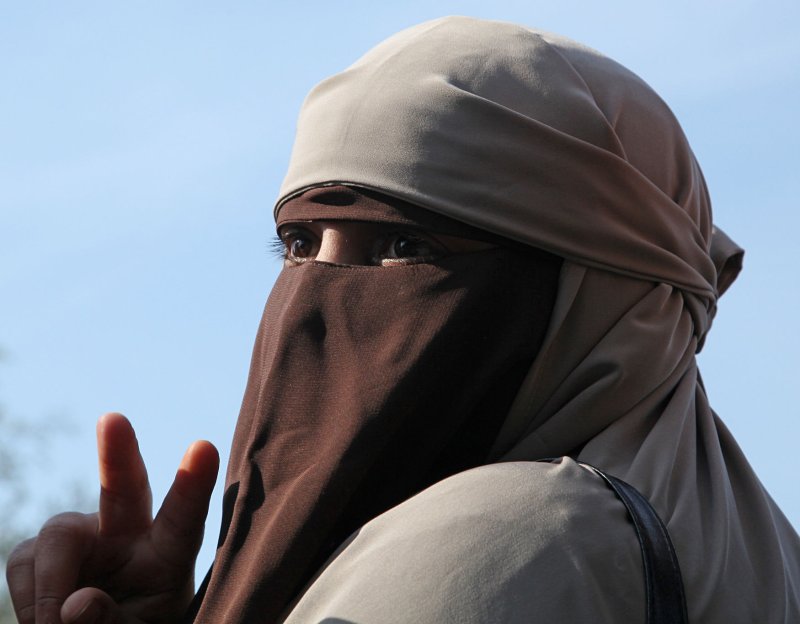1 of 8 | A woman wears a burqa (full-face veil) in front of Notre Dame Cathedral in defiance of a new French law banning the garment in Paris on April 11, 2011. The controversial new law takes effect today and officially bans all garments which cover the face. Violators are subject to a fine of 150 euros ($217). UPI/David Silpa |
License Photo
PARIS, April 11 (UPI) -- French police say they arrested nearly 60 women after a ban on wearing face-coverings went into effect Monday.
Two of the women were arrested in front of the Notre Dame cathedral in Paris when police moved in to break up an unauthorized protest against the ban, Radio France Internationale reported.
Two other women were detained as they traveled to the rally from Britain and Belgium. Belgium has a similar law, but it has yet to be enforced.
The ban has angered Muslims and some women said they will disobey the new law.
A Parisian Muslim woman vowed she would wear a full-face covering Monday in defiance of the law.
"I will go shopping, to the post office and to City Hall if necessary," Kenza Drider told India's New Delhi Television in Paris. "I will, under no circumstances, stop wearing my veil," which she said was "a submission to God."
France has Western Europe's largest Muslim population -- more than 5 million people out of a total 62 million population.
Fewer than 2,000 women are believed to wear a full-face veil, the government said. Most live in working-class suburbs of Paris and Marseille, France's second-largest city, and are French citizens.
The law -- passed in October but enforced after a six-month waiting period to inform people of the penalty -- forbids women from hiding their faces.
"The French Republic lives in a bare-headed fashion," French Prime Minister Francois Fillon said in an official government newspaper explaining the law.
The banned outer garments include the full-body burqa and the face-covering niqab, which typically leaves the eyes visible.
"The ban does not target the wearing of a headscarf, headgear, scarf or glasses, as long as the accessories do not prevent the person from being identified," the Interior Ministry said in a statement.
Police can detain women who refuse to remove their face veils for up to 4 hours and fine them as much as $217, force them to take a citizenship course or may impose all three punishments, said a March 31 Interior Ministry letter to police departments cited by Le Figaro.
Anyone forcing a woman to wear a face-covering -- which the government calls "a new form of enslavement that the republic cannot accept on its soil" -- faces a year in prison and a $43,500 fine. Forcing a minor to do the same thing is punishable by two years in prison and $87,000.
France's Constitutional Council, which seeks to ensure French constitutional principles and rules are upheld, said the law did not impose disproportionate punishments or prevent Islam's free exercise in places of worship, CNN reported.
"Public order" rests on some "minimal requirements of life in society," including exposing one's face in public, the council said in affirming the law's constitutionality.
Amnesty International has repeatedly urged France not to impose the ban, saying it violates European human-rights laws. Other rights groups allege the law targets a vulnerable and isolated part of French society and stokes Islamophobia.
The non-profit French Council of the Muslim Faith, France's main Muslim representative body, which serves as an official interlocutor with France in the regulation of Muslim religious activities, took a moderate position on the law.
It said insisting on wearing a niqab, a head-covering that leaves only the eyes showing, or a burqa, a full-body covering with a mesh screen over the eyes, was an "extremist" reading of the Koran and not a "religious obligation."















